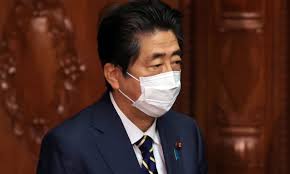Loading
Search
▼ Japan’s Shinzo Abe Apologises Over ‘Cherry Blossom’ Scandal
- Category:Other
Ex-PM says he was unaware that his office had subsidised cherry blossom viewing parties for his supporters.
Former Japanese Prime Minister Shinzo Abe has apologised for what he said were mistakes regarding unreported political funds involving as much as 30 million yen ($289,807) and corrected statements he had made in parliament over the issue.
Abe told a parliamentary committee on Friday that he felt deeply responsible for repeatedly denying allegations that his office had subsidised cherry blossom viewing parties for his supporters from 2016 to 2019, in possible violation of Japan’s strict political funding laws.
The former prime minister said he had known nothing about the payments and pledged to work to regain public trust.
“Even though the accounting procedures happened without my knowledge, I feel morally responsible for what happened,” Abe told the committee. “I reflect on this deeply and apologise from my heart to the citizens and to all legislators.”
He also filed corrected political funding reports for the last three years.
Politicians in Japan are forbidden to provide anything to constituents that could be construed as a gift. The rule is so strict that two ministers in Abe’s cabinet last year had to quit in quick succession for giving things such as melons, crabs and even potatoes to voters in their constituencies.
The scandal involving Abe’s office started after opposition legislators raised questions about a 2018 dinner party for which Abe’s guests paid a 5,000 yen ($48) fee. They said that was low for a party at an upscale Tokyo hotel and alleged Abe’s office covered the difference.
On Thursday, the Tokyo District Public Prosecutor’s Office handed a summary indictment against Abe’s secretary, Hiroyuki Haikawa, and fined him 1 million yen ($9,650) over the scandal. The indictment alleged that Haikawa, 61, failed to report that 11.6 million yen ($111,600 ) in admission fees were collected from party guests and an 18.7 million yen ($180,000) payment was made to the hotel.
The prosecutor’s office decided not to press charges against Abe, however, citing a lack of evidence.
The Mainichi newspaper reported on Thursday that Japanese Twitter users protested against the prosecutor’s decision not to seek charges against Abe. The hashtag “I protest the decision not to indict Shinzo Abe” was trending on the social media platform, with 160,000 tweets posted with the phrase by Thursday afternoon, the daily reported.
Opposition legislators say the former prime minister – who stepped down in September citing ill health – gave false statements about the issue in parliament at least 118 times.
Abe’s public apology marks a sharp reversal of fortune for Japan’s longest-serving leader, whose grandfather and great-uncle also served as premiers.
The 66-year-old leader quit as prime minister in September after serving in the role for nearly eight years.
The scandal threatens to damage his successor, Yoshihide Suga, who was Abe’s right-hand man throughout his term and who has defended his former boss in parliament.
Suga, who has been beset by other controversies and seen his support ratings slide less than a year before the next lower house election must be called, has apologised for making inaccurate statements.
In parliament on Friday, Abe did not respond to questions from opposition legislators about whether he would take political responsibility for the scandal by resigning as a member of parliament.
He also struggled to explain why he was able to file detailed updated funding reports even though he said his office does not have the underlying receipts for the parties.
- December 25, 2020
- Comment (0)
- Trackback(0)


